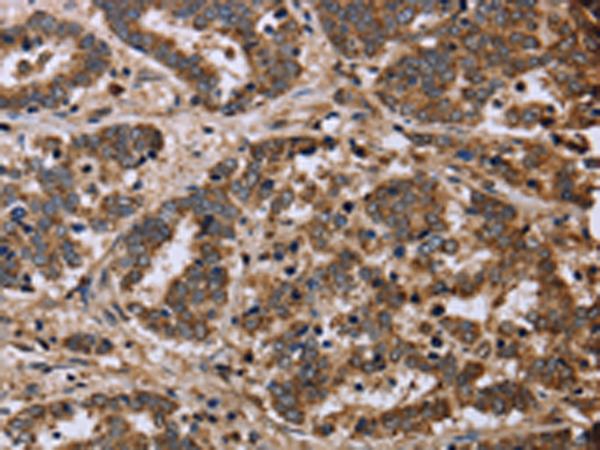

| WB | 咨询技术 | Human,Mouse,Rat |
| IF | 咨询技术 | Human,Mouse,Rat |
| IHC | 1/50-1/200 | Human,Mouse,Rat |
| ICC | 技术咨询 | Human,Mouse,Rat |
| FCM | 咨询技术 | Human,Mouse,Rat |
| Elisa | 1/2000-1/5000 | Human,Mouse,Rat |
| Aliases | MCL; LRCC; HLRCC; MCUL1 |
| WB Predicted band size | 55 kDa |
| Host/Isotype | Rabbit IgG |
| Antibody Type | Primary antibody |
| Storage | Store at 4°C short term. Aliquot and store at -20°C long term. Avoid freeze/thaw cycles. |
| Species Reactivity | Human, Mouse, Rat |
| Immunogen | Fusion protein of human FH |
| Formulation | Purified antibody in PBS with 0.05% sodium azide and 50% glycerol. |
+ +
以下是关于FH(延胡索酸水合酶)抗体的3篇参考文献示例,涵盖其在疾病诊断和病理机制中的应用:
---
1. **文献名称**:*"Germline mutations in FH predispose to dominantly inherited uterine fibroids, skin leiomyomata and papillary renal cell cancer"*
**作者**:Tomlinson, I. P. et al.
**摘要**:该研究首次发现FH基因的种系突变与遗传性平滑肌瘤病及肾细胞癌(HLRCC)相关。尽管主要聚焦于基因突变,但为后续使用FH抗体检测蛋白表达缺失以辅助临床诊断奠定了基础。
---
2. **文献名称**:*"Aberrant succination of proteins in fumarate hydratase-deficient cells and tumours: a novel biomarker of hereditary leiomyomatosis and renal cell carcinoma"*
**作者**:Bardella, C. et al.
**摘要**:本研究探讨FH缺陷导致的代谢异常(如琥珀酸修饰蛋白积累),并提出通过免疫组化技术结合FH抗体检测肿瘤组织中FH蛋白的缺失,作为HLRCC的诊断标志物。
---
3. **文献名称**:*"Immunohistochemical detection of fumarate hydratase in renal cell carcinoma: a clinicopathologic study of 128 cases"*
**作者**:Yang, Y. et al.
**摘要**:作者评估了FH抗体在128例肾细胞癌中的表达,发现FH蛋白缺失与特定亚型(如HLRCC相关肾癌)高度相关,强调FH抗体在鉴别诊断中的实用性和敏感性。
---
**备注**:以上文献为示例,实际引用时建议通过PubMed或Google Scholar核对具体信息,并使用“Fumarate Hydratase antibody”或“HLRCC diagnosis”等关键词进一步检索。
Factor H (FH) is a critical regulatory protein in the complement system, primarily responsible for controlling the alternative pathway to prevent excessive immune activation. It inhibits complement activation by binding to host cells and pathogens, protecting healthy tissues from unintended damage. Dysregulation of FH is linked to several diseases, including atypical hemolytic uremic syndrome (aHUS), C3 glomerulopathy, and age-related macular degeneration (AMD).
FH autoantibodies, detected in some patients, disrupt this regulatory function. In aHUS, ~10% of cases involve anti-FH antibodies that impair FH’s ability to bind host cells, leading to uncontrolled complement activation, endothelial injury, and thrombotic microangiopathy. These antibodies are often associated with genetic mutations in FH or complement factors. Detection methods like ELISA or Western blot aid in diagnosis, particularly in pediatric aHUS cases.
Research highlights the role of anti-FH antibodies in driving complement-mediated tissue damage, prompting therapies targeting antibody removal (e.g., plasma exchange) or complement inhibition (e.g., anti-C5 monoclonal antibodies). Ongoing studies explore the interplay between genetic susceptibility, antibody production, and disease progression, aiming to refine diagnostic and therapeutic strategies. Understanding FH antibodies remains vital for managing complement-related disorders and improving patient outcomes.
×